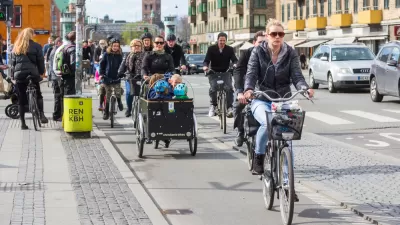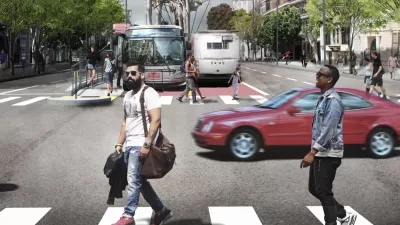It was always a risk that states would use funding from the federal Infrastructure Investment and Jobs Act to double down on the transportation systems that create congestion and air pollution.

“A $283 million boost in federal highway money that Wisconsin is getting from Washington got approval from the Legislature’s budget committee Tuesday, but only after the Republican majority rewrote some of the spending plan for the new funds,” reports Erik Gunn for the Wisconsin Examiner.
“The money comes to the state as a result of the federal [Infrastructure Investment and Jobs Act] enacted in late 2021 and the 2022 federal appropriations bill that followed this March,” adds Gunn to explain the state’s largesse.
The reasoning behind the Republican rewrite of the spending plan is worth paying attention for planners and advocates hoping to fund and complete projects proven to reduce automobile trips, reduce congestion, and reduce air pollution from combustion engines. The original plan for the $283 million, proposed by the Wisconsin Department of Transportation (WisDOT), devoted $4.3 million of the funding to the state’s Congestion Mitigation and Air Quality Improvement program (CMAQ). The changes implemented by Republican committee members, however, ensure that the CMAQ funding won’t be spent on bicycle, pedestrian, or trail facilities.
The WisDOT is limited to spending CMAG funds in non-attainment and maintenance counties (i.e., high air pollution areas, as defined by federal law) in southeastern and northeastern Wisconsin—Milwaukee, Racine, Kenosha, Waukesha, Washington, Ozaukee, Walworth, Sheboygan, Kewaunee, Manitowoc, and Door—so the funding changes deliver a blow to plans in the locations that need non-polluting transportation projects the most.
FULL STORY: Finance committee gives OK to most of state’s plan for extra federal highway money

Planetizen Federal Action Tracker
A weekly monitor of how Trump’s orders and actions are impacting planners and planning in America.

San Francisco's School District Spent $105M To Build Affordable Housing for Teachers — And That's Just the Beginning
SFUSD joins a growing list of school districts using their land holdings to address housing affordability challenges faced by their own employees.

The Tiny, Adorable $7,000 Car Turning Japan Onto EVs
The single seat Mibot charges from a regular plug as quickly as an iPad, and is about half the price of an average EV.

With Protected Lanes, 460% More People Commute by Bike
For those needing more ammo, more data proving what we already knew is here.

In More Metros Than You’d Think, Suburbs are Now More Expensive Than the City
If you're moving to the burbs to save on square footage, data shows you should think again.

The States Losing Rural Delivery Rooms at an Alarming Pace
In some states, as few as 9% of rural hospitals still deliver babies. As a result, rising pre-term births, no adequate pre-term care and "harrowing" close calls are a growing reality.
Urban Design for Planners 1: Software Tools
This six-course series explores essential urban design concepts using open source software and equips planners with the tools they need to participate fully in the urban design process.
Planning for Universal Design
Learn the tools for implementing Universal Design in planning regulations.
Smith Gee Studio
City of Charlotte
City of Camden Redevelopment Agency
City of Astoria
Transportation Research & Education Center (TREC) at Portland State University
US High Speed Rail Association
City of Camden Redevelopment Agency
Municipality of Princeton (NJ)





























